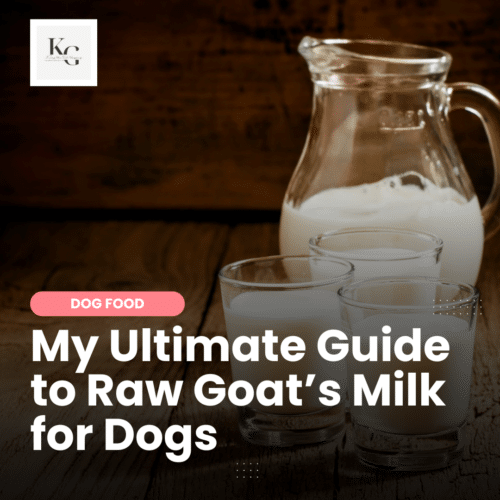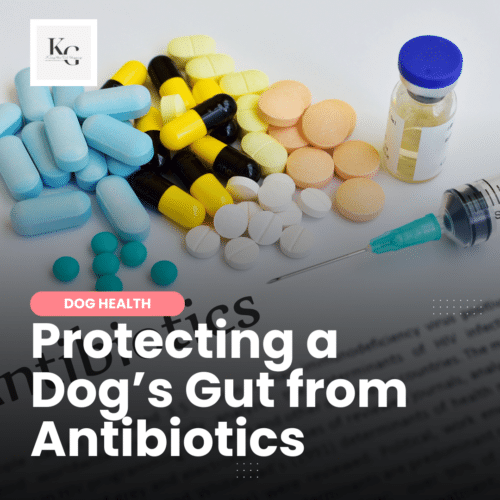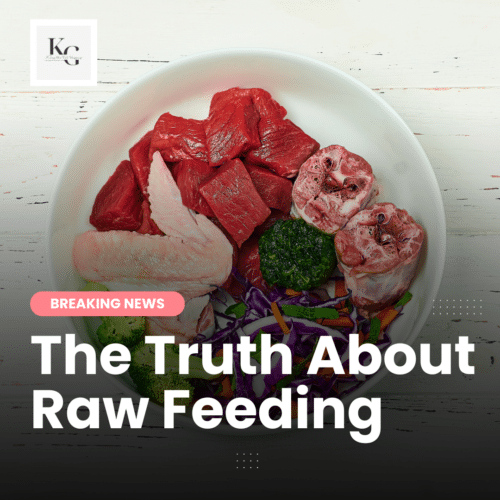Keep the Tail Wagging is supported by pet parents. I occasionally earn a commission (at no additional cost to you) when you click through an affiliate link to one of my favorite products. Thank you for your support. Read More
I am not a veterinarian.
Seeing a sign that one of my dogs is eating poop is so discouraging. They walk into the house, smacking their mouth as if they just finished eating something and there is nothing in the yard that they would be eating other than grass and poop.
Whenever you look up how to stop a dog from eating poop, or coprophagia, you'll find article after article with lists of products that deter this gross habit. Still, we must address why our dogs eat dog poop, especially when it seemingly starts out of the blue.
Why Dogs Eat Poop
After more than ten years raising dogs, I've learned a few things about why dogs eat poop and how best to stop the habit. Four of our dogs have eaten poop at some point in their lives despite being raw fed. So, let's recap; dogs eat poop because…
1 – Something is Lacking in a Dog's Diet
My dog, Rodrigo, was looking for the digestive enzymes in the poop. He has had a history of digestive issues since he was a puppy. I didn't realize that his pancreas wasn't compromised until 2019. However, years ago, I began adding a digestive supplement to his diet that stopped the poop eating. Some people ask why I didn't add fermented foods, raw goat's milk, or kefir – I did, and they weren't enough for him.
2 – A Dog is Curious
This is more for puppies because they're curious about everything, and everything goes in their mouth. If you have an adult dog that is a poop eater, a puppy might follow their lead.
3 – A Dog Likes the Taste of Poop
Sadly, some dogs like the taste of poop. This is the case with cat poop, so our dogs don't have access to the area of our home where the litterbox lives.
4 – A Dog Has a Bad Habit
If a dog has a history where they had to eat their stool to keep a kennel clean, then it might be hard to deter this behavior. I've been told that this is seen in rescue a lot with neglected dogs.
5 – Your Dog is Hungry
And if a dog is hungry, then he may begin consuming stool. This is something that is also seen with neglected dogs.
Is Coprophagia the Beginning Stage of EPI?
Having lost two dogs to cancer and raising a dog diagnosed with EPI, I have officially accepted that I'm a helicopter dog mom. One role of an obsessive dog mom is Poop Inspector.
I've been told that if a dog regularly has mucus covering their stool (or tons of mucus), then a call to the veterinarian is a good idea. However, in my dog's case, I decided to treat him at home with probiotics and digestive enzymes (more about this below) because my dog wasn't showing any signs of illness.
If your dog isn't feeling well, call your veterinarian.
How to Stop a Dog from Eating Poop
People will tell you to sprinkle hot sauce on the poop or add pineapple or meat tenderizer to your dog's dish. Many products are available to stop stool eating – Solutions Pet Products has a herbal blend for this purpose. This may seem like the easiest way to address the issue, but if your dog has digestive issues, these tips only serve as a bandaid and not a permanent solution. In this post, I will share five things that have helped stop this behavior in my dogs.
1 – Improve the Diet
If you've been to my blog before, then you can guess that I'm going to recommend raw feeding. This was the improvement that I made, and it worked for my dogs. But raw feeding isn't the only way to improve your dog's diet. You can try one of the following:
- home cooking
- hybrid diet (raw & home cooking, raw & kibble)
- freeze-dried or dehydrated food
- adding fresh food (raw, cooked, freeze-dried, dehydrated, sardines, vegetables, bone broth, etc.) to kibble
The goal is to feed a diet that promotes a healthy gut, which, in my opinion, includes fresh food.
2 – Train Your Dog Not to Eat Poop
If one of my dogs' breath smells like poop, I begin watching their behavior. One of the easiest ways for me to stop poop eating that wasn't due to a health issue is through training. Whenever my dogs go outside for a potty break, I go with them and if I notice them becoming curious about poop, I wait until they're right about to lick or take a bite and firmly say, “Leave it!” This has to be done consistently, and during training, I don't allow the dog in question to go potty alone.
I never punish my dogs for this behavior; it's not necessary. In my experience, training stops the majority of stool eating, but, as I said, if I'm not around to see them, I'm not around to deter them.
3 – Pick Up Dog Poop Regularly
Since I'm not always able to monitor my dogs, I clean up their yard daily. This task allows me to look at how everyone's poop is, and I can combine this chore with training (because the dogs come out with me). One thing I'm looking for, despite a clean yard, is loose stool, diarrhea, or poop with a lot of mucus (which is a sign of an irritated gut). And because we have multiple dogs, it's easier to apply the remedy to everyone's diet unless a dog shows signs of digestive issues – like eating poop.
If snow is in the forecast, I clean the yard before it starts snowing and continue daily poop pickup because the snow isn't a deterrent.
4 – Add Canned Pumpkin to the Diet (Optional)
Canned pumpkin (or sweet potato) is usually given to dogs with diarrhea or anal gland issues. But I read somewhere that while dogs enjoy a dollop of canned pumpkin, they don't like the taste of pumpkin-flavored poop. So adding a tablespoon of canned pumpkin (we have big dogs) may help to deter the poop eating while you're working on getting the gut in order. I add the pumpkin to each meal for at least two weeks while working on the gut.
Canned pumpkins in the grocery store aisle contain baking products (cookie/cake mixes, flour, sugar, spices, etc.). Look for the 100% canned pumpkin (no spices) and when you find it on sale, purchase several cans because this is a great food to have on hand when raising dogs.
5 – Add a Digestive Supplement to the Diet
Because I know my dogs aren't hungry or nutrient deficient, poop eating in our home means that the gut needs more support with probiotics and digestive enzymes. The easiest way to add these to the diet is with raw goat's milk, kefir, and fermented foods. However, with some dogs, whole food options may not be enough, and that's when I turn to supplementation. For two weeks, I add a supplement to my dog's meals (I feed my dogs twice daily). I continue adding goat's milk and fermented foods to the diet.
Adored Beast Apothecary
I alternate between several of the digestive supplements formulated by Adored Beast, including:
A Warning About Digestive Enzymes
If your dog is new to digestive enzymes, start easy – don't start with the recommended dosage on the container. I learned firsthand that the side effects of digestive enzymes could include cramps, constipation, diarrhea, gas, nausea, or vomiting. I suggest starting with one scoop and slowly increasing to a dosage that works for your dog. If your dog has gas or any other symptoms (previously mentioned), back off on the dosage or try another supplement.
Rodrigo was diagnosed with exocrine pancreatic insufficiency in 2019. I add Enzyme Diane's digestive enzymes to each of his meals. This supplement is too potent for random use. I reach for Healthy Gut by Adored Beast Apothecary for my other dogs.
Digestive Enzymes that Didn't Work
The following two digestive enzyme supplements made my dogs sick. Of course, this could be limited to my dogs, but I want to warn others because, in one case, my dogs experienced vomiting, diarrhea, and extreme gas.
- NaturVet – Digestive Enzymes for Dogs – Plus Prebiotics & Probiotics
- Mercola Healthy Pet Digestive Enzymes
Can We Stop Our Dogs from Eating Poop?
I'm sure some dogs will eat poop no matter what we do. In my experience with my dogs, this gross habit can be stopped once the cause has been addressed. One of the cool things about raising dogs is their behavior. After more than a decade of raising dogs, I've learned to pay attention to what they're trying to tell me, and when one of my dogs suddenly starts eating poop, it's because they need more gut support.
Every dog is unique, and in my experience, it takes about two weeks of supplementation and training to see this behavior disappear.



















Thanks so much, Michele
Oh! I forgot to tell you I also have both of your books and love them.
Thanks for another great article! You ROCK! I have a house full of rescue dogs with various back grounds and have been battling poop eating with several of them for years. I swear some of them it learned it from others. I actually have to race a few them to the poop shouting “leave it!”. I pick up poop immediately, partly because being a retired vet-tech I know how important it is to monitor poop for potential medical issues, but mostly because I don’t want anyone to eat it. I just switched everyone to raw about a month ago, and have been using goat milk to assist in gut health. I am so grateful I found you and I’ve already seen a HUGE improvement in the amount and consistency of poop, and yes when you have as many dogs as I do, that is SUPER EXCITING! (maybe I need to get out more.) Your articles and FB videos (and chats with Dr. Coger) have been invaluable in my raw feeding education. I cannot thank you enough for your positive attitude and generosity in sharing information. After reading this I ordered Full Bucket (great company!) Alas, the great no-poop eating battle still continues, but now I have hope. Thanks again!